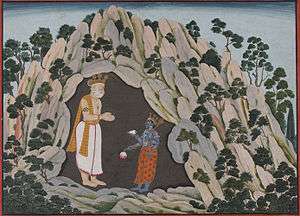Mandhatri
| Mandhatri | |
|---|---|
 | |
| Information | |
| Family | Yuvansha (father) |
| Spouse(s) | Bindumati Chaitrarathi |
| Children | Purukutsa, Ambarisha and Muchukunda |
Mandhatri or Mandhata (Sanskrit: मान्धातृ, Māndhātṛ), in Hindu mythology, was an Ikshvaku dynasty king and son of Yuvanashva.[1] He married Bindumati Chaitrarathi, daughter of Yadava king Shashabindu and granddaughter of Chitraratha.[2] According to the Puranas, he had three sons, Purukutsa, Ambarisha and Muchukunda.[3]
The hymn 134 of the tenth mandala of the Rigveda is attributed to him.[4]
According to the Mahabharata, he was a son of the Suryavansha king Yuvanshva.[5]
Legend
Birth
King Yuvanaswa of Ayodhya was childless. Once, he went on a hunting expedition and in the afternoon, he became wracked with thirst. Yuvanaswa had child called mandhata.
One century later, the gods came down and slit open the left side of Yuvanaswa's abdomen and brought the baby boy. Indra, King of the Gods declared "He shall draw sustenance and desendence from me", or "Mandhata". The milk began to accelerate the boy's growth. Within twelve days, he resembled a twelve-year-old boy who was thirteen cubits tall. By just practicing it, Mandhata acquired the entire knowledge of the Vedas and military sciences. Mandhata acquired an impenetrable armour, a quiver with an inexhaustible supply of arrows and the Ajagava bow (originally belonging to Shiva) which fell from the sky. Mandhata ascended the throne.
Conquests
King Mandhata had the ability to control rains and riches. As a result, he abolished taxes. By mere willpower, he conquered the entire earth in one day. He proceeded to vanquish the kings Marutta, Asita, Angara, Nriga, Brihadratha, Suna, Jaya, Janamejaya, Sudhanwan, Gaya, the ruler of Gandharas and several others in battle. Mandhata conquered Patala loka (west) , mrityuloka (central) and half of Swargaloka (eastern) and became lord of the three worlds.
It is mentioned in the Mahabharata that Mandhata, the King of Ayodhya, gave away colossal statues of Rohita fish, entirely made up of pure gold and spanning several kilometers to the Brahmanas as charity. He also gave away 10,000 Padmas (10 quintillion) of cows of the best breed to the Brahmanas during his sacrifices. Mandhata performed a hundred Ashwamedha Yagnas and a hundred Rajasuya Yagnas. He built 1,008 magnificent palaces for the Goddess Shakti and was a devotee of Shiva.
Mandhata was also known as Yauvanashwin (son of Yuvanashwa) and Trassadasyu (one who was feared by the wicked). He once fought Ravana, King of Lanka in a duel, but it ended in a stalemate. Ravana was later defeated and slain by Rama, a descendant of Mandhata and the greatest Ikshvaku King of Ayodhya.
Mandhata married the Chandravanshi princess, Bindumati, the daughter of Shashabindu, King of the Yadavas. The couple had three sons and fifty daughters. His sons Purukutsa, Ambarisha and Muchukunda were equally illustrious. [3] Mandhata's daughters fell in love with the handsome ascetic Saubhari and married him. Mandhata's eldest son, Susandhi succeeded his father.
Death
As Mandhata grew old, he became proud of his strength and desired to entirely conquer Swarga, the heavenly regions ruled by Indra. Indra was perturbed by this and told Mandhata that he had not completely conquered the earth. Indra told Mandhata that the Asura Lavana, the son of Madhu, was not a subject to his rule.
Mandhata was ashamed and invaded Madhupuri, the city of Lavanasura. Lavana possessed a divine trident given to his father by Lord Shiva. As long as he had the trident, nobody could vanquish Lavana in battle. Lavana wielded the trident and burnt Mandhata and his forces, reducing them to ashes in an instant. Lavana was later slain by Shatrughna, a descndant of Mandhata. Shatrughna made sure that Lavana did not possess the trident at that time and killed him.
Notes
- ↑ John Dowson (1870), A classical dictionary of Hindu mythology and religion, geography, history, and literature, Trübner & Co., pp. 197–8
- ↑ Pargiter 1972, p. 150.
- 1 2 Pargiter 1972, p. 93.
- ↑ Pargiter 1972, pp. 102-4.
- ↑ Mahabharata, III.126
References
- Pargiter, F.E. (1972) [1922], Ancient Indian Historical Tradition, Delhi: Motilal Banarsidass
